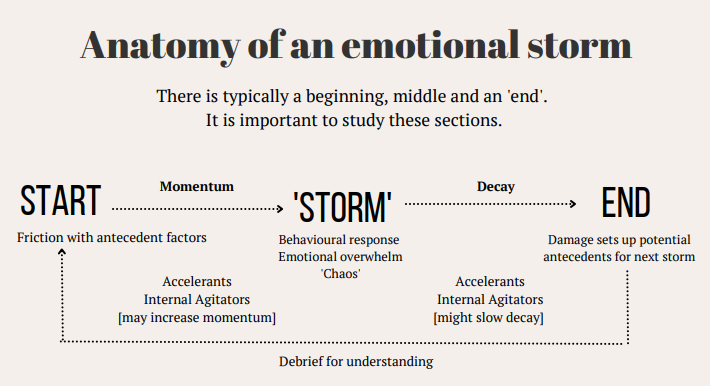Anxiety, Parenting, and What Actually Helps
Real world reflections from the clinic, the home, and everywhere in between
Getting through tough parenting seasons

Winters can be rough (or any season for that matter depending on your circumstances) in our lives and it can really feel like it's never-ending.
I think though that this could be our opportunity to take stock, rest and store energy we need for new growth. To plan what seeds we want to sow when the time come perhaps.
It can be extremely hard when or if a cold bitter season arrives. I definitely struggle to remain hopeful and to be still especially when it feels like there are cold harsh winds of various demands and pressures bearing down - and all we're trying to do is to stand still!
But when I find moments of stillness, I do my best to capitalise on those moments and spend energy really meditating on the ordinary things - what else can I really do in the midst of overwhelm? I can't think too far ahead because that might just heap anxiety onto what I'm already feeling, I don't want to think about the past too much lest it fills me with whatever unhelpful stifling emotion that that ...
Instilling Values in Children: A Guide for Parents

As parents, we try our best to shield our children from negative influences. However, the reality is that children are like sponges, absorbing everything they see and hear, even if they don't fully understand it. That's why it's crucial for us to guide them through these experiences and help them make sense of the world around them.
Teachable moments are the best opportunities to teach our children about values. It's in the day-to-day moments of life that they see our values play out organically. For instance, instead of giving a didactic lecture on the merits and demerits of virtue ethics, children will learn more from watching how we handle conflicts and problems in the heat of the moment.
It's important to ask children questions about how they perceive situations and how they would respond. This helps to structure conversations around the values you would like to impart. Using stories from books or movies can also help to illustrate important values. Be sure to ide...
Managing Sibling Jealousy: The Key to Maintaining Strong Family Bonds
Sibling rivalry, while a natural part of growing up, can strain relationships if not managed effectively. It’s crucial to stay alert to your children’s emotional health and respond suitably when signs of jealousy emerge.
A specific form of jealousy that demands our attention stems from the fear of losing parental affection. Children may react in various ways when they feel insecure, ranging from subtle hints to explicit actions. The remedy, however, remains constant - fostering connection. Empathy and quality time form the foundation of all personal relationships, and it’s essential to prioritize these for our children. We must strive to provide them with as much attention and connection as possible.
Inevitably, some children may require more attention than others. Hence, it’s vital to create unique traditions and rituals for each child. Allocate individual time for each of them and guard this time as if it’s indispensable. While maintaining equal attention for all might be challengi...
The Art of Praising Children: Balancing Motivation and Humility
Many of us believe that praising and complimenting children is a positive action, but did you know that there is also such a thing as unhelpful praise? How can we reinforce good behaviour without unintentionally overinflating their ego? How do we ensure that our approval isn't dependent on their performance? In this video, we've outlined four key ideas to help you navigate this tricky topic:
- Be authentic and genuine with your praise
- Connect with your children frequently, so they don't feel like your attention is based solely on their accomplishments.
- Avoid comparing your child to others
- Refrain from praising or commenting on aspects of their appearance or natural intelligence, as they have no control over these factors.
Tune in to this episode on the podcast to learn more.
Episode 084: dont be cringe when you praise your kids. Try this technique.
Encouraging Children to Express Emotions Non-Verbally
I wanted to share one of my favourite tips for helping kids talk about emotions (using an empathic approach). And you actually don't have to do a heap of talking yourself! Jump in and check it out now!
Tips for Dealing with Picky Eaters
In most cases, fussy eating is a part of growing up. It's an expression of independent thinking and a need for mastery and control over one's environment, body and choices. But, I don't hear parents celebrating! Fussy eating can be exasperating.
But let's take a step back and think a little bit about what we would be doing if we were presented with limited food options that didn't appeal to us. Have you ever travelled some place where the food wasn't really stuff you'd eat? How did the locals treat you? Did they force feed you? If they did, I'm sure you wouldn't visit right? (1 star review!!!) We might be curious about the strange new foods there but we'd prefer to try them at our own speed.
Here are some tips to help you adjust your 'speed' and help your kids try the 'local' cuisine in your household.
The first thing is to keep your cool around meal times to minimise stress for your child (I know you will be stressed enough for the both of you); otherwise, Kids will associate mea...
What does an emotional storm look like?
Visualizing the various stages of an emotional storm can be very beneficial. By using a pictogram, you can identify the antecedents that fuel the storm, as well as the factors that dissipate its power. This approach can help you develop a deeper understanding of how emotional storms operate, so you can better navigate them in your life.

Tips for Dealing with Backchatting Children
Here are some tips to help you deal with backchatting:
- Be the adult. Take a deep breath and avoid getting caught up in the argument. Nothing gets solved by escalating the situation.
- Set the tone in your household by establishing rules of engagement. Praise your children when they follow these rules, as this will reinforce the behaviour you want to see. It's better to acknowledge good behaviour than to scold bad behaviour.
Managing Emotions in the Heat of the Moment: Using the H.A.L.T Acronym
As grown-ups, it's often challenging to manage the intense emotions our children stir within us. It's tempting to react impulsively, but it's crucial to keep our calm and avoid regrettable behavior.
The H.A.L.T acronym is a simple yet effective tool to regulate our emotions.
H is for Hunger – Most of us function poorly when we're famished, and our kids are no different. Providing them with nutritious snacks and meals throughout the day can help keep them satiated and focused.
A is for Angry – It's essential to acknowledge and validate our children's emotions, but it's equally crucial to choose our moments wisely. Waiting for the flames to subside before disciplining or teaching is more effective than reacting impulsively.
L is for Lonely or Lost – Sometimes, our children feel disconnected, and it's our job to bridge that gap. Reconnecting with them through play, conversation, and shared meals can help them feel more secure and settled.
T is for Tired – W...
Finding the Right Balance: Encouraging Kids to Push Themselves
As parents, we often find it difficult to determine the appropriate amount of pressure to place on our children when we believe it will benefit them. If you're met with resistance, consider the following before deciding how much pressure to apply:
- Check your motivations - While it's great to witness your child experience the satisfaction of accomplishment, are you pushing them for selfish reasons?
- Assess their temperament, interests, and stage of development in relation to the activity. Understanding your child's personality and learning style is crucial to determining how much encouragement they can manage.
- Evaluate their skill set. Do they possess the necessary abilities to handle the challenges of the task at hand? Perhaps they need additional support to develop specific skills that will increase their enjoyment of the activity.
When you're ready to push your child, apply gentle pressure, much like when teaching them how to ride a bike.
We hope this advice is helpful...

